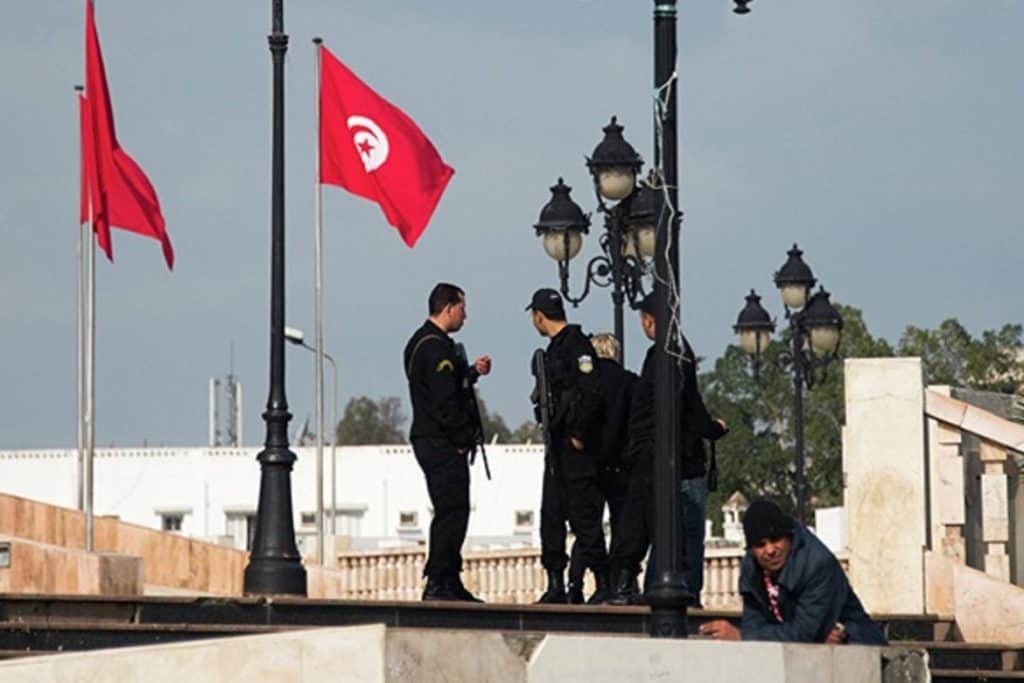By Denis Korkodinov – Interview with Nadia Shehadeh
After the death of Tunisian President Beji Kied Essebsei, Tunisia was in a state of political crisis. Islamists, disappointed with the outcome of the “Arab Spring” in 2011, are trying to take advantage of the situation to strengthen their positions in the electoral environment, pushing it to commit radical actions that could cause significant damage to Tunisia’s national security.

Especially for WorldGeostrategicInsights, we talked about this with Nadia Shehadeh, Tunisian political analyst, writer in the newspaper «Al-Binaa» аnd a political editor at topNews «Nasser Kandil».
1. Tunisia, according to many political experts, is the only positive example of the “Arab spring”. At the same time, even the death of President Beji Kaid Essebsei did not affect the change in Tunisia’s almost impeccable reputation. Meanwhile, Tunisia, like most countries in the Arab world, is under considerable pressure from various terrorist groups, including the Islamic State, which threaten to undermine democratic institutions in North Africa. How is the government of Tunisia and its law enforcement agencies fighting manifestations of international terrorism? How relevant for Tunisia is the issue of the influence of the Islamic State, especially after the death of Beji Qaeda Essebsey? Is there any threat of terrorist organizations using any presidential candidates in Tunisia to influence the outcome of the election process?
-The Tunisian government has worked to fulfill the people’s wishes to establish freedoms and uphold human rights, and to amend the Constitution, which establishes the principles of governing and broadens political participation.Tunisia maintained democracy after the death of President Essebsi because within a short period the Tunisian government was able to secure an orderly transfer of power through the constitution.
Tunisia managed to besiege the terrorist phenomenon that sought to invade the country after the revolution.It tried to take advantage of the country’s turbulent political situation by forcibly controlling it .Political stability after the 2014 elections helped to strengthen security coordination with Algeria, which has extensive experience in fighting terrorists.
Attacks by terrorist groups in Tunisia have declined due to the development of skills and technical expertise of the security forces and their ability to identify, detect and detain terrorists.The Tunisian state now needs to revitalize its organs and strategic plans to detect terrorism. The government must be equipped to improve the social, economic and ideological conditions that drive extremism and threaten the stability of Tunisia.
2. A large number of candidates (27 people) for the presidency of Tunisia, according to several analysts, indicate an increasingly unstable political situation in the country, which seeks to confirm the democratic achievements of 2011. At the same time, there is a risk that a candidate from a moderate Islamist party may become the head of state as a result of the elections, as a result of which a change in the political regime may occur in Tunisia. Is it really? How likely is it that Islamist presidential candidates can get a majority of the vote? What are the forecasts for the results of the presidential election in Tunisia?
– 15 September will be a watershed day in the history of Tunisia.On this day, Tunisians will elect their president amid expectations of a heated election battle.Ennahda’s attempt by the Tunisian branch of the Muslim Brotherhood to control the Carthage palace after Abdel Fattah Moro was presented in the presidential elections With Ghannouchi’s attempt to control parliament, the movement controls the Tunisian legislative and executive institutions, which will result in the fall of the state to the Brotherhood.
The forthcoming presidential elections represent a serious shift in Tunisian history. Through it the people will confirm the fact of urbanization. Moro’s defeat is a defeat for the Brotherhood project. As for the expectations of the results of the presidential elections, the chances of all candidates for the presidency do not appear to be equal for many considerations, including :Presenting a significant number of candidates who count on the democratic family, which will lead to the dispersion of votes and weaken the share of each candidate belonging to this family.
Perhaps the second round between Abdul Karim Zubaidi and Abdel Fattah Moro, which will push the parties of the democratic family to unite all to support Abdul Karim Zubaidi to face the candidate of the Renaissance. And within the framework of the old renewed ideological conflict that the 2014 Constitution was unable to eliminate or curtail the political elites of both parties
3. On August 26, 2019, the Ministry of Defense of Tunisia issued a statement announcing that the country’s government forces will strengthen military preparedness in the border area with Libya. According to the country’s defense department, a number of armed groups are making active attempts to infiltrate Tunisia from Libya. The basis for such conclusions was the incident on August 24, 2019 on the Tunisian-Libyan border, as a result of which the militants were forced to retreat to Libyan territory. Does this fact indicate the intention of the official Tripoli or opposition forces in Libya to intervene in the internal affairs of Tunisia? Can Libyan armed forces influence the results of the Tunisian presidential election? Is it possible against this background, a complication of relations between Tunisia and Libya?
– The war in Libya affects the Tunisian political landscape as various parties stand by the Wefaq government led by Fayez Sarraj and its Islamist allies, or with the army led by Khalifa Hifter and his regional allies. Terrorist risks are high as the Tunisian-Libyan border extends for more than 500 kilometers, after the dangerous regional variables of the return of terrorists from ISIS and Jabhat al-Nusra and their status in the Libyan west and their alliance with the government of Fayez al-Sarraj, Especially after ensuring that the terrorist groups present in Libya have not changed their methodology to target the security and stability of Tunisia.
The position of the Libyan Armed Forces, led by Field Marshal Khalifa Hifter, is known from the Ennahda Movement,The Libyan Armed Forces may be trying to influence the results of the Tunisian presidential election and work on Ennahda’s failure to reach Carthage Palace. General Hifter: Tunisia is one of the countries that stood strong politically with Libya.General Hifter believes that Ennahda leader Rashid Ghannouchi has a role in bringing the Tunisian government closer to the Islamists of Libya.
4. Shortly before the incident on the Tunisian-Libyan border, Tunisian Foreign Minister Khmayis al-Jhinaui emphasized his country’s efforts to find ways to resolve the crisis in Libya in order to ensure peace. Does this statement indicate Tunisia’s intention to mediate the negotiations between the Libyan National Army under the command of Khalif Haftar and the government forces of Tripoli? What action plan is Tunisia ready to implement to ensure peace in neighboring Libya? Does the Libyan government recognize Tunisia’s positive contribution to the de-escalation of the conflict between the various forces in the region?
– Despite several diplomatic efforts by the late President of the Republic Beji Caid Essebsi and Foreign Minister Khamis al-Jinawi, related to contacting the parties to the current conflict and the government of Al-Wefaq and the forces of Hifter and calling them to resort to a political solution Under the umbrella of the United NationsBut these efforts have had little effect.
The performance of Tunisian diplomacy towards the Libyan file remains limited and faltering,It is surrounded by a lot of ambiguity, and is not commensurate with the great political and economic interests of Tunisia with this country, which shares a border line of about 500 kilometers Since the beginning of the crisis several years ago, the Tunisian diplomacy’s handling of the Libyan file has been weak and does not rise to the level of Tunisian interests with this country and its variables.
Tunisian diplomacy has no vision of the recent crisis in Libya.Sometimes he supports the Al-Wefaq government, and another with General Hifter.Tunisian diplomacy is now required to define its position on the Libyan file and stay away from the ambiguity and contradiction Taking into account Tunisian interests and the regional and international situation.Tunisia does not have the tools to influence Hifter or Sarraj, especially since the positions of the major powers are contradictory towards the Libyan file.
5. Just two months ago, on the Internet, one of the most pressing topics was information about the transfer to Tunisia of the American private military company “Engility”, which, according to several sources, aims to train Tunisian opposition units to prepare for a coup. How valid is this information? Is there currently a risk of a coup attempt in Tunisia? How active are U.S. private military companies in Tunisia?
Numerous newspaper reports reveal a major US military presence on the African continent, particularly in Tunisia. And the existence of a military base and a training center to combat terrorism in southern Tunisia.The report highlighted that the US military is training security forces or assisting in the war on terror, the report revealed that US military aid to Tunisia has doubled in three years.
And news reports confirming the participation of the United States of America in the qualitative operations in the framework of the fight against terrorism in Mount Chaânbi on the Algerian border, Tunisia has become one of the most reliable partners of the United States.
The US intervention has become a reality in Tunisia, which indicates that Washington intends to reduce its military presence in the west of the African continent in exchange for strengthening its north.AFRICOM. President Thomas Weidhauser told the New York Times that Tunisia is “Our partner more reliable and suitable for us” but the sensitivity of the issue made it confidential for fear of a retaliatory terrorist response from extremist groups in North Africa and the issue of the US military presence is particularly sensitive for the Tunisian street.
6. In January 2018, Abu Dhabi, Washington and partially Algeria tried to organize social protests in Tunisia aimed at rehabilitating the Islamic movement, which the Tunisian government still opposes. Can it be argued that against the background of the upcoming presidential elections in Tunisia, social unrest can resume in the country? How prepared is the Tunisian government to neutralize the epicenters of social protest in the country?
-The political, economic and social challenges facing the Tunisian government today are worse than in 2011,The factors that made the protests spread are still strong.But what happened in January 2018 cannot be considered a protest,Because recorded acts of sabotage, looting and assault on citizens. The Interior Ministry announced the arrest of dozens of demonstrators
The coming period in Tunisia is expected to be hot on both social and economic levels, given the various difficulties that are now prevailing in the country. The government will be under the pressure of the citizen who demands to ensure the normal functioning of his life without disruption and demand to respond to the financial demands of the protesting sectors,the government will also be confronted with the social congestion caused by sustained price increases.
Unless the government tries to implement a number of decisions in favor of the poor social class and seeks to absorb the state of anger. But this remains tied to the recovery of the Tunisian economy and thus alleviate the fiscal pressure on citizens.
Image source: TheReference







